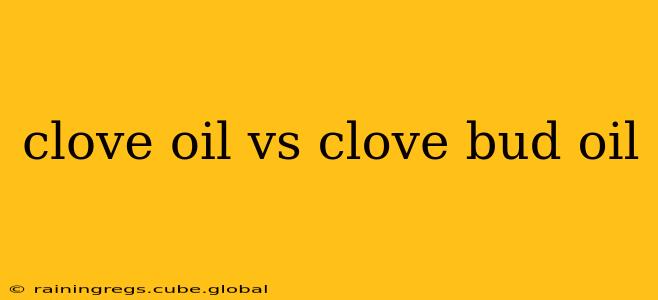The terms "clove oil" and "clove bud oil" are often used interchangeably, leading to confusion. While they are closely related and share many properties, there are subtle yet important distinctions. This article will clarify the differences, helping you make informed choices when using these potent essential oils.
What is Clove Oil?
Clove oil is an essential oil extracted from the dried flower buds of the Syzygium aromaticum tree, also known as the clove tree. It's a complex mixture of chemical compounds, with eugenol being the dominant component (typically comprising 70-90% of the oil). The extraction process involves steam distillation of the dried buds. This process yields a highly concentrated oil with a characteristic strong, spicy aroma. The term "clove oil" is often used broadly to refer to this essential oil, regardless of the specific extraction method or parts of the plant used.
What is Clove Bud Oil?
Clove bud oil is a more precise term, specifically referring to the essential oil extracted solely from the flower buds of the clove tree. The process of obtaining clove bud oil is identical to that of clove oil—steam distillation. The key difference lies in the emphasis on the origin: it explicitly points to the flower buds as the source. Because the buds are the primary source of the essential oil's active components, "clove bud oil" often signifies a higher quality and more potent product compared to oils extracted from other parts of the clove plant (though such oils are less common).
Are Clove Oil and Clove Bud Oil the Same Thing?
In essence, yes, the terms are largely synonymous in practical use. Most commercially available "clove oil" is indeed derived from the flower buds. However, the more specific term "clove bud oil" provides greater clarity regarding the oil's source and often implies a higher level of purity and concentration of eugenol, the main active compound responsible for many of clove oil's beneficial properties.
People Also Ask: What are the differences in their chemical composition?
While both oils primarily contain eugenol, minor variations in chemical composition can occur based on factors such as the geographic origin of the cloves, the harvesting methods, and the distillation process. These variations can affect the oil's color, aroma, and efficacy slightly, but generally, the core chemical profile remains largely similar. Detailed chemical analysis would reveal these nuances.
People Also Ask: Which one is better for medicinal use?
For medicinal purposes, both clove oil and clove bud oil are equally effective, provided they are of high quality and pure. The concentration of eugenol is the primary factor determining its potency. The “better” oil depends on the specific application. Look for a high eugenol percentage (70-90% or higher) rather than focusing on the specific name.
People Also Ask: What about the price difference?
Price differences may reflect the purity, source, and the marketing of the product rather than a fundamental difference between clove oil and clove bud oil. Higher prices often indicate high-quality, more carefully sourced and processed oils with a verified eugenol content.
People Also Ask: How can I identify high-quality clove oil or clove bud oil?
Look for oils that specify the method of extraction (steam distillation is preferred), state the percentage of eugenol, and mention the geographic origin. Reputable suppliers will provide this information. Avoid oils with vague descriptions or those that lack transparency about their sourcing.
Conclusion
Ultimately, the difference between clove oil and clove bud oil is largely semantic. Both refer to an essential oil derived from the clove tree's flower buds. Using the term "clove bud oil" emphasizes the specific source, which often correlates with higher quality and purity. Regardless of the term used, focus on the quality and eugenol content of the oil to ensure you are getting a potent and effective product for your intended use, whether it's for culinary purposes, aromatherapy, or topical application.
